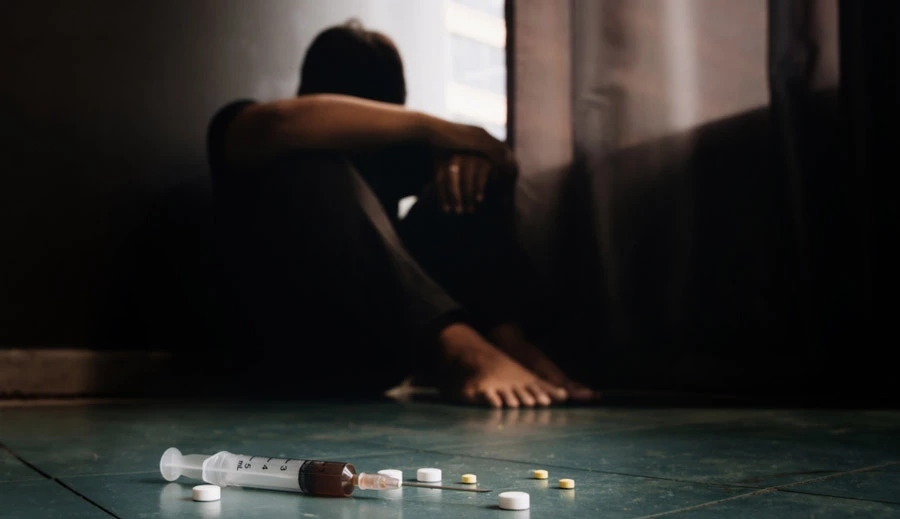Support to Overcome Drinking and Traumatic Stress
In the complex mental health landscape, the intersection of Post-Traumatic Stress Disorder (PTSD) and alcohol abuse is a critical area of concern. The intricate relationship between these two conditions often leads to a vicious cycle of suffering and self-medication. But alcohol use will only worsen PTSD symptoms.
Here at South Shores Detox and Recovery, nestled along the sunny southern California coast, we can help. We have helped thousands of people with PTSD and alcohol abuse issues manage their symptoms and live a fulfilling and sober life.
If you’re reading this, you probably grapple with these issues or know someone who is. This guide will help you more comprehensively understand PTSD, its connection to alcohol abuse, and the path to recovery. Seeking treatment is brave, so we commend you.
Keep reading and find the many forms of support available now at South Shores!
Quick Stats About Post Traumatic Stress Disorder (PTSD)
According to the National Institute of Health (NIH), PTSD affects approximately 3.5% of U.S. adults, with an estimated one in eleven people diagnosed with PTSD in their lifetime.
The Anxiety and Depression Association of America (ADAA) further notes that women are five times as likely as men to have PTSD. These statistics underscore the widespread nature of PTSD and its significant impact on society.
The takeaway from those stats – you’re not alone! Many struggle with this disease along with alcohol use disorder. And the dedicated staff of South Shores Detox and Recovery are here to help.
What are Typical PTSD Symptoms?
Trauma survivors should know what PTSD signs and symptoms to look out for, both to identify if PTSD is present, as well as to monitor recovery from traumatic stress.
Behavioral Signs of Post Traumatic Stress Disorder
- Behavioral signs of PTSD are often the most visible indicators of this condition. Individuals may exhibit irritability, and become annoyed or angered by situations that would not have bothered them before the traumatic event. The irritability can strain relationships and make social interactions challenging.
- Aggressive behavior is another common sign. It may manifest as verbal outbursts, physical violence, or hostility towards oneself. This aggression is often a misguided attempt to regain control or protect oneself from perceived threats.
- Self-destructive actions, such as reckless driving, substance abuse, binge drinking, or self-harm, are common. These actions are often a cry for help or a way to cope with overwhelming emotions.
- A heightened startle reaction, or “jumpiness,” is another behavioral sign. It can come from loud noises, sudden movements, or anything that reminds one of their trauma.
- Avoidance is a key behavioral trait of PTSD. That can involve steering clear of places, people, or activities reminding the individual of the traumatic event. This avoidance leads to social isolation and reduced quality of life.
Common Physical Signs of PTSD
- Physical signs of PTSD often involve the body’s stress response. Difficulty sleeping is common, as the mind may keep restful sleep at bay. Restlessness can lead to chronic fatigue and other health issues over time.
- Nightmares related to traumatic experiences are another common physical sign. These can be incredibly distressing and can further disrupt sleep.
- A heightened startle response can also have physical manifestations. Individuals may startle at sudden noises or movements, leading to a racing heart or rapid breathing.
- When reminded of the past experience, PTSD sufferers may experience physical reactions, like a racing heart, sweating, or trembling. These symptoms are part of the body’s fight-or-flight response and can be very distressing.
The Mental and Emotional Signs of PTSD
- Mental or emotional signs of PTSD can cause distress and decrease quality of life. Intrusive thoughts about the traumatic event can invade the individual’s mind at any time, making it difficult to focus on other tasks.
- Flashbacks, or vivid, often distressing, memories of the traumatic event, can make it feel like the trauma is happening all over again. Reminders of the event can trigger these and can be incredibly distressing.
- Severe emotional distress is common among PTSD sufferers, often manifesting as intense fear, horror, anger, guilt, or shame. These emotions can be overwhelming and challenging to manage.
- Feelings of numbness and disinterest in previously enjoyed activities can also occur. That can lead to detachment from others and a loss of interest in life. This emotional numbing is often a coping mechanism, helping the individual to avoid painful emotions associated with the trauma.
How PTSD Intersects With Alcohol Abuse
PTSD can lead to substance abuse. That’s because individuals often turn to alcohol or drugs as a way to self-medicate. They’re attempting to numb their pain or regain control. However, this coping mechanism is detrimental.
That’s because it often makes PTSD symptoms worse. Plus, they can lead to alcohol dependence or substance use disorders.
The most effective way to treat PTSD is through professional treatment that addresses all underlying mental health conditions and PTSD symptoms together. Alcohol use disorder and substance abuse only mask the real problem.
Dual Diagnosis: Treatment for PTSD and Alcohol Abuse
PTSD and alcoholism rarely occur in isolation. A complex interplay of conditions necessitates a dual-diagnosis treatment approach that addresses all co-occurring disorders.
For instance, someone might have one mental health condition (like PTSD) and an additional mental health disorder – like alcohol addiction or an additional mental illness. Volumes of alcohol research dictate that they must address the root of all mental health issues, alcohol problems, and drug dependency for complete healing.
PTSD will often coexist with additional mental health disorders. Think generalized anxiety disorder, bipolar disorder, and severe depression.
But a PTSD diagnosis can also occur alongside alcohol misuse, drug abuse, or a substance use disorder. Substance abuse disorders are common.
And you are in the right place – we know how to treat both PTSD and alcohol addiction effectively, beginning with medically supervised alcohol detox services.
What Traumatic Event May Cause Someone to Develop PTSD?
Developing PTSD can result from various traumatic events.
- Sexual Assault: Sexual abuse is a profoundly traumatic event that can lead to PTSD. Survivors may experience severe emotional distress, nightmares, and flashbacks.
- War Veterans: Military veterans, including Vietnam veterans, often experience PTSD. It comes from the intense and life-threatening nature of service.
- Violent Traumatic Events: Violent events such as muggings, physical assault, or witnessing violence can trigger PTSD.
- Car Accidents: Car accidents, particularly severe ones, can lead to PTSD. Survivors may relive the trauma through flashbacks and nightmares.
- Death of a Loved One: The sudden or violent death of a loved one can cause one to develop PTSD. These traumatic events lead to intense grief and recurrent distressing memories.
- Childhood Trauma: Childhood trauma, including physical abuse or living in a family with substance use disorders, alcohol misuse, or sexual abuse, can have long-lasting effects. These risk factors may cause PTSD in adulthood, as children do not have the coping mechanisms to handle these events.
How Is Post-Traumatic Stress Disorder Diagnosed?
The American Psychiatric Association cites specific criteria in the Diagnostic and Statistical Manual for diagnosing PTSD. These include a traumatic experience, intrusive symptoms, avoidance of trauma-related stimuli, negative patterns in cognition and mood, and changes in one’s arousal and reactivity.
A diagnosis of PTSD requires a thorough evaluation by a professional who can help present a wide range of treatment options.
Therapies to Heal Post Traumatic Stress Disorder With Alcohol Use
Several therapeutic approaches have proven effective in treating this mental health condition in those who abuse alcohol. These therapies provide the tools and strategies to manage symptoms, cope with distress, and ultimately lead a healthier, more fulfilling life.
- Dialectical Behavior Therapy (DBT): DBT is a cognitive-behavioral treatment approach. It emphasizes developing four critical life skills: mindfulness, distress tolerance, emotion regulation, and interpersonal effectiveness. It’s particularly effective in treating self-destructive behaviors and emotional instability.
- Group Therapy: Group therapy provides a supportive environment where clients share experiences, learn from each other, and develop and refine new skills. It can reduce feelings of isolation and provide a sense of community and understanding that lasts long after leaving a program.
- Support Groups: Alcoholics Anonymous or PTSD groups offer a safe space for individuals to share their struggles and successes, gain insights from others with similar experiences, and receive emotional support.
- Family Therapy: This treatment involves treating the family as a unit and can be particularly beneficial when the individual’s PTSD and alcohol use have affected family dynamics. It can improve communication, resolve conflicts, and strengthen the family’s ability to support the individual’s recovery.
How to Tell If Your Alcohol Consumption Is Out of Control
Recognizing when alcohol consumption has crossed the line from moderate or social use to problem drinking is crucial for early intervention and successful recovery. Alcohol use disorders often develop gradually. That makes it easy to overlook the signs of substance abuse until it becomes severe.
If you find yourself frequently drinking alcohol to cope with stress or to numb the emotional pain associated with co-occurring PTSD, this could be a sign of a developing issue. Using alcohol to self-medicate can lead to alcohol dependence over time.
Binge drinkers, who consume large amounts of alcohol in a short period, are at an exceptionally high risk of developing alcohol use disorders. This pattern of drinking can quickly lead to tolerance and dependence, and it’s often associated with a range of physical and mental health problems.
Drinking problems can manifest as a persistent desire or unsuccessful attempts to reduce or control alcohol use. You may find that you’re spending much time obtaining alcohol, using it, or recovering from its effects.
Reaching Out for Effective Support to Overcome PTSD and Alcohol Abuse
Alcoholism treatment is most effective when it addresses not only the alcohol use disorder but also any co-occurring mental disorders, such as PTSD. This comprehensive approach ensures that all underlying issues are addressed, improving the chances of long-term recovery.
It’s also important to note that using other substances, such as drugs, can exacerbate drinking problems and complicate treatment. If you’re using other substances besides alcohol, disclosing this information to your treatment provider is crucial.
If you suspect that your alcohol consumption is triggering trauma and becoming out of control, it’s essential to seek help immediately. Early intervention can prevent the development of severe health problems and improve the chances of successful recovery.
The Importance of a Solid Foundation of Support
Recognizing that you need help is the first step of recovery. Seeking PTSD treatment is a sign of strength, not weakness. Even better, it begins your journey toward healing and recovery.
At South Shores Detox, we understand the courage it takes to reach out. We’re here to support you every step of the way.
Our team of compassionate, experienced drug and alcohol treatment professionals will guide you through diagnosis and treatment. We specialize in treating PTSD and alcohol abuse. We’ll provide you with the highest level of care. We believe a holistic recovery approach is essential when addressing all underlying causes of your struggles.
We also understand that navigating the financial aspects of treatment can be overwhelming. That’s why we have dedicated insurance coordinators to help you understand your coverage and maximize your benefits. We work with most insurance providers. Our team will advocate to ensure you receive the treatment you need.
Seek Sobriety and Overcome Trauma at South Shores Today
At South Shores Detox and Recovery, we believe in the power of connection. We’re not just a treatment center. We are a community. We’re here to answer your questions, ease your concerns, and provide the resources you need to understand your condition and the path to recovery.
PTSD and hazardous drinking can feel isolating, but you don’t have to face it alone. We’re here to help. Connect with us today for a confidential consultation, and let us walk this journey with you. Our mission is your recovery from alcohol dependency and healing of your PTSD.
Together, we can help you see a healthier, happier future, so reach out to get options now!






